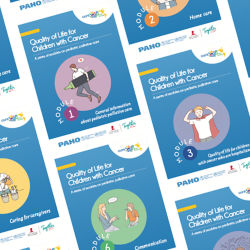Palliative Care: A Mutual Understanding

April Bezilla with her daughter, Alexis.
My daughter Alexis met palliative care after the protocol (research plan or clinical trial) she was on stopped working.
This was not my first experience with terminal illness, but this time it was different. This was Alexis. For me to have conversations about dying, final wishes, and updates, I had to come to a place of acceptance.
I knew she would need me in a way she never had before. I took my fears and heartbreak and put them in a box, hidden away in the back of my mind. My own devastation stayed hidden, so I could not find a path to acceptance. I could not say the words or initiate the conversation with Alexis that I knew we needed to have.

Alexis, April’s only child, inspired her mom to advocate for pediatric cancer patients and their families.
Crucial conversations
We started to meet weekly with the palliative care team. We discussed logistics. Do we stay near her treatment center, or do we go home? Depending on that choice what does care look like? We talked about what was important in terms of her care, and they encouraged us to have conversations about end of life. The end of her life. The thing is, I couldn’t do it. I could not look at Alexis and tell her she was not going to survive.
At this point in Alexis’ journey, I began to pray harder and barter with the universe, with ALL the powers that be. I prayed for a miracle or that the universe would take me instead. I think part of the reason I could not have the “conversation” was because I was still hoping for a miracle. If I said it aloud, then it seemed like I would cement her fate in stone. I knew this was out of my control, but this was my child, and she was dying.
Alexis was disconnected through all of it. She was never fully present in those appointments. She was not herself. I knew she was struggling. We needed to talk but I did not want her to think I was giving up. I was not giving up; I was begging the heavens to save her.
The path to acceptance
One afternoon, her doctor said something that started Alexis on her path to acceptance.
Alexis stopped us and asked me if her doctors were giving up on her. She was incredibly angry. Angrier than I had ever seen her. I knew what she was really asking: She was asking me if she was going to die. All I could tell her was that they were not giving up but that her cancer was growing rapidly and had stopped responding to treatment. She knew what I meant.
Later that night, we climbed into bed and turned on the TV. We were both quiet. The day had been so hard. Then Alexis said, “Mom, you have to promise me something.” She was composed, thoughtful, and no longer angry. She wanted me to promise that her dad and I would be OK. I just cried. I did not know if we would be OK, but I promised her that we would be anyway.
After that night, there was a change to Alexis. She was herself again. She was light and open. She was finding joy in life again. She wanted to spend the time with her friends and family. Most of all, she was able to love and be loved.
Alexis and I found a way to discuss what was happening without using the word “death.”
People often talk of regrets after a loved one passes. We did the best we could with the choices we had. I do not know that looking back and questioning those decisions would give me comfort. I do know that at the end, Alexis knew how much she was loved, and we knew how much she loved us. For me, that is all that matters.





